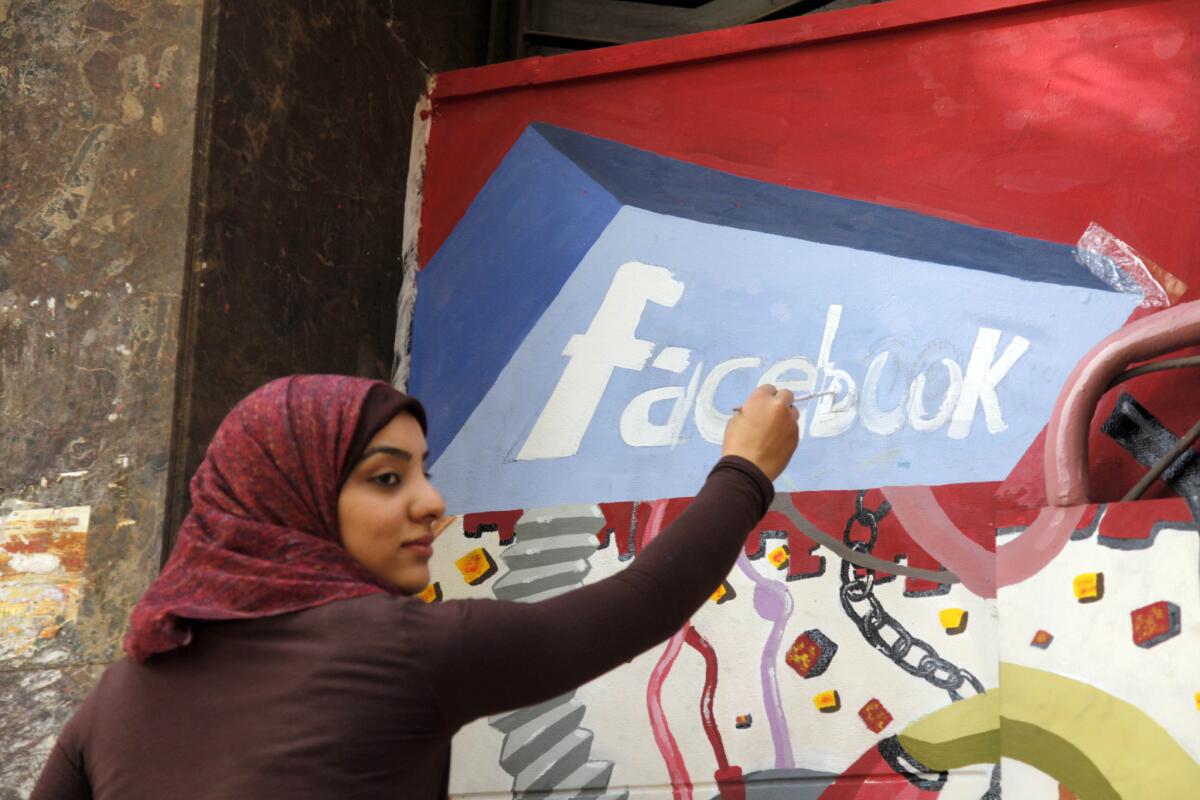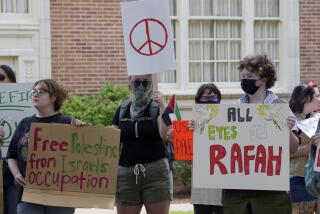Egypt’s expanding crackdown now appears to include cultural institutions

An art student paints the Facebook logo on a mural commemorating the 2011 uprising against former Egyptian President Hosni Mubarak in Cairo. Facebook says Egyptian authorities have shut down a program that was providing free basic Internet service to more than 3 million users in the country.
Many of those who took part in the 2011 uprising against former Egyptian President Hosni Mubarak hoped that the strongman’s fall would herald the beginning of a new era of free expression.
But those hopes have long been dashed. This week alone, Egyptian authorities shut down a respected art gallery and theater, arrested political activists and raided an independent publishing house in what critics described as another worrying crackdown on dissent as the country approaches the fifth anniversary of the revolt.
Nearly 70 public figures, including popular Egyptian political satirist Bassem Youssef and former presidential candidates Hamdeen Sabahi and Khaled Ali, condemned such moves in a joint statement posted Wednesday on Facebook.
Join the conversation on Facebook >>
“The Egyptian regime is deploying the same practices that led to the Jan. 25 glorious revolution,” the statement said. “Freedoms are seized, pluralism is barred and security authorities rule and control everything.”
The same day, Facebook announced that a new program that had been providing free basic Internet service to more than 3 million Egyptians had been shut down.
The country’s communications authority did not immediately explain the decision to halt the service launched with Etisalat Egypt. In a statement to the Associated Press, Facebook said it was disappointed and hoped to “resolve this situation soon.”
Thousands of protesters have been detained and put on trial since President Abdel Fattah Sisi came to power in a 2013 military coup amid massive protests against the country’s elected leader, President Mohamed Morsi.
What began as a crackdown against Morsi’s Islamist supporters has expanded to include secular activists and apparently cultural spaces popular with the government’s critics.
On Monday, officials from the state Censorship Authority, Tax Authority, National Security and Ministry of Manpower raided the Townhouse art gallery and its affiliated theater in downtown Cairo before shutting down the venue. No explanation was provided.
On Tuesday, it was the turn of Merit publishing house. Officials from the Censorship Authority raided the premises and arrested a staff member who was questioned about his employer’s political interests before being released later in the day.
Merit’s owner, Mohamed Hashem, suggested that the move was in response to an upcoming event to show solidarity with poet Ashraf Fayadh, who has been sentenced to death by a Saudi Arabian court.
NEWSLETTER: Get the day’s top headlines from Times Editor Davan Maharaj >>
“We will expose the corrupt and hold the event as scheduled,” Hashem wrote on his Facebook page. “You won’t terrorize us.”
Other examples of the expanding crackdown include the decision this week to refer Khaled Sayed, a member of the Revolution Youth Coalition that represented a number of youth groups during the 2011 uprising, to a military trial on charges of belonging to a terrorist group, inciting murder and spreading false information.
The April 6 Youth Movement, which also played an active role in the revolt, reported that four of its members had been arrested at their homes without being told of the charges. The group’s founder and leader, Ahmed Maher, is one of many dissidents serving jail terms on charges of organizing a demonstration without permission from the authorities, as required under a law introduced in 2013.
George Ishak, a founding member of the National Front for Change launched by Mohamed ElBaradei, who gained international renown as head of the United Nations’ nuclear agency, said such arrests show that the 2011 uprising did not achieve its goals.
Calls for fresh protests on Jan. 25 have been spreading on Egyptian social media accounts in recent weeks. More than 50,000 users have signed up for updates from a Facebook page titled “We’ll bring down autocracy on Jan. 25.”
Zyad Elelaimy, a former member of parliament, accused the government of trying to contain dissent by goading activists into a showdown.
“The regime is prepared for such a confrontation and will use it to cover up the financial catastrophes that will send the country to the verge of ruin,” he posted on his Facebook page.
In a speech last week, Sisi suggested that those calling for another revolution “want to waste the country and destroy the people.”
Special correspondent Hassan reported from Cairo and Times staff writer Zavis from Los Angeles.
For more international news, follow @alexzavis on Twitter
ALSO
Turks, Belgians report foiling plans for holiday attacks
Arson case in Israel prompts debate about extremism, interrogation techniques
Two Islamic State operatives with ties to Paris attackers reported killed in airstrikes
More to Read
Sign up for Essential California
The most important California stories and recommendations in your inbox every morning.
You may occasionally receive promotional content from the Los Angeles Times.










